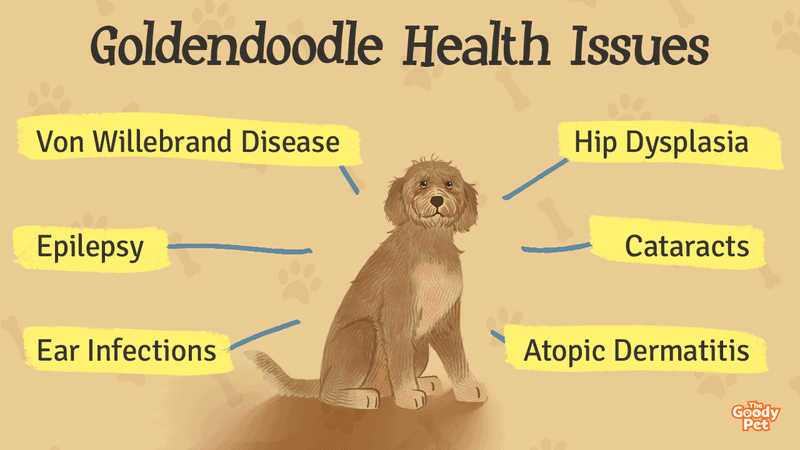As a dog owner or even a prospective dog owner, we would hate for our furry friends to be in any pain or discomfort. Hence, you most likely feel the need to know which health issues your Goldendoodle is prone to.
The most common health issue among Goldendoodles is hip dysplasia, followed by subvalvular aortic stenosis and sebaceous adenitis. Hip dysplasia can severely impact the life of your Goldendoodle that requires adequate rehabilitation to lead a normal life. However, diseases such as subvalvular aortic stenosis and sebaceous adenitis are potentially life-threatening and require medical treatment.
Let us discuss these three health issues, as well as the other conditions, that your Goldendoodle may be prone to.
12. Hip Dysplasia
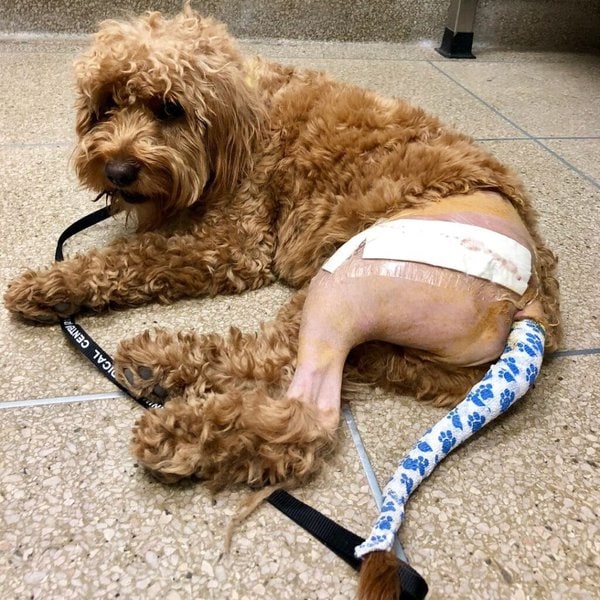
The hip bones are made up of a ball and a socket. When dogs, like Goldendoodles, suffer from hip dysplasia, the ball and socket begin to rub against one another causing tremendous pain. The rubbing leads to the deterioration of the dog’s joints.
This is a genetic disease that can be self-induced through rapid weight gain due to overfeeding. If your Goldendoodle is overweight, excess strain is placed on their joints. Depending on the severity, your Goldendoodle may either need a new nutritional diet plan or hip surgery.
11. Sebaceous Adenitis

Sebaceous adenitis is a disease that destroys the sebaceous glands. These glands provide the skin with moisture so when they are damaged, it may cause your Goldendoodle’s fur to become patchy or even fall off.
There is no known cause for this disease, however, it is believed that sebaceous adenitis is a hereditary condition. You should contact your veterinarian if you notice your Goldendoodle has developed symptoms such as hot spots, scabs, or clumped-up hard fur.
If, however, you do not think that it is severe then, you can treat your Goldendoodle’s skin and fur by using oil sprays and oil baths.
10. Atopic Dermatitis

Atopic Dermatitis disease is caused by airborne allergens like dust mites, dander, or pollen. These allergens will irritate the skin leading to excessive scratching and wounds. Your Goldendoodle’s skin will typically become greasy or scaly with flaky dandruff.
Contact your nearest veterinarian to get your Goldendoodle the medical care they need. Their treatment will include but is not limited to anti-itch shampoos and antibiotics.
9. Epilepsy

Goldendoodles are susceptible to epilepsy which, in turn, may lead to seizures. This disease affects the thyroid gland and is easy to spot. You should watch out for symptoms such as jerking, muscle twitching, tongue chewing, foaming at the mouth, and collapsing.
If you notice any of those symptoms, you should get your Goldendoodle some immediate medical attention. They will decide on whether to put your Goldendoodle on some medication or adjust their diet in order to treat and heal them.
8. Patellar Luxation

Patellar refers to a knee cap and luxation is dislocating, so this is when your Goldendoodle dislocates its knee joint. This is extremely painful because the joint of the back leg pops in and out of place during movement.
The common symptoms to look out for include when your Goldendoodle carries their leg abnormally, limps, or any swelling at the leg. Take them to the veterinarian and depending on the severity they will be treated with either painkillers or surgery.
7. Von Willebrand Disease

This disease is genetic and is a condition where blood is unable to clot properly. The Major cause of this disease is a missing or inefficient von Willebrand factor. This can be detrimental to your Goldendoodle because it means their wounds will take longer to heal.
When this happens, they will bleed for extended periods or be exposed to many bacterial or viral infections which may require medical treatment. The most frequent treatment methods are costly blood transfusions.
6. Cataracts

Cataracts develop when there is some opacity on the ocular lens which affects your Goldendoodles vision. Their eyes will get cloudy, and their vision will gradually worsen.
You should take your Goldendoodle to your veterinarian for a diagnosis. Treatment for cataracts is surgery, which is costly as it involves using sound waves to dissolve the lens, and a suction device is used to remove the debris.
5. Addison’s Disease

Addison’s disease occurs when the adrenal gland is damaged or does not work properly causing your Goldendoodles cells to malfunction and begin to attack themselves. The adrenal gland is responsible for hormonal balance which ensures that cells throughout the body function well.
This often leads to muscle and weight loss so look out for these symptoms and others like vomiting. The treatment for Addison’s disease is hormone therapy and shots every 21 days.
4. Hypothyroidism

Hypothyroidism is a disorder that is characterized by the malfunction of the thyroid. The thyroid is a gland that is responsible for releasing a hormone that regulates metabolism.
If your Goldendoodle is affected by hypothyroidism, their bodies would be incapable of effectively converting the food into fuel. Symptoms include weight gain, lack of energy, and seizures.
3. Subvalvular Aortic Stenosis
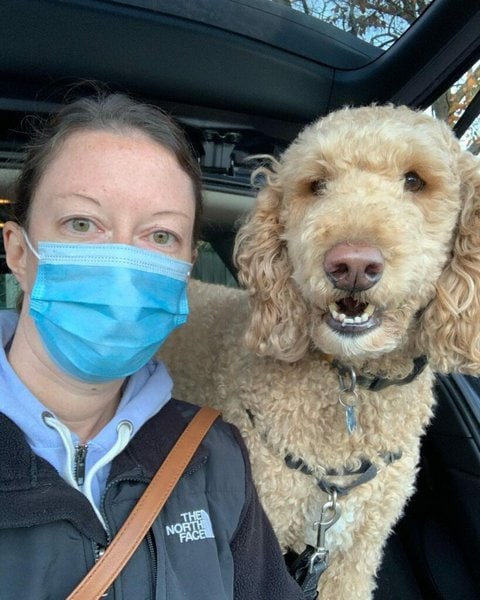
Also known as subaortic stenosis, subvalvular aortic stenosis is another potentially life-threatening disease. The blood flow to the aortic valve is obstructed which, in some extreme cases, can cause heart failure.
If your Goldendoodle avoids exercise or easily becomes out of breath after exercising only for a short while, you should go to a veterinarian so that they can be diagnosed and treated.
2. Gastric Dilatation Volvulus
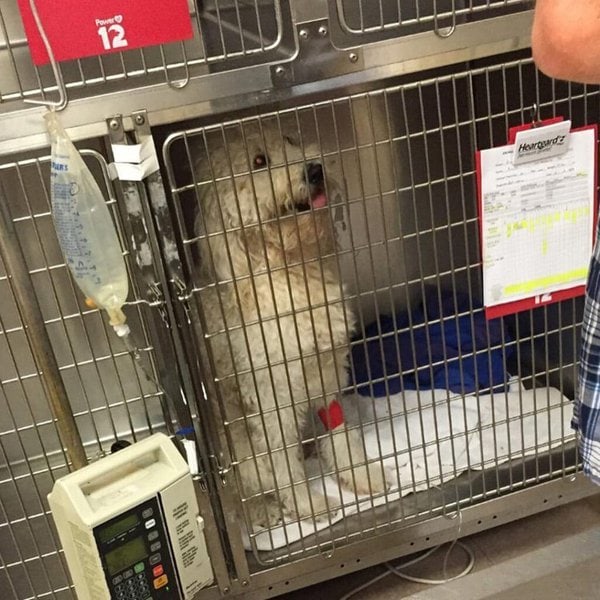
Gastric Dilatation Volvulus is a life-threatening condition that occurs when the stomach twists and prevents airflow. This twisting causes the air to be trapped inside your Goldendoodle’s stomach, causing the stomach to expand. In severe cases, your dog will enter a state of shock.
Common symptoms that may occur include gaging, retching, pale gums, and mood swings. You should immediately contact your veterinarian if your Goldendoodle displays these symptoms so that they can be treated.
1. Ear Infections
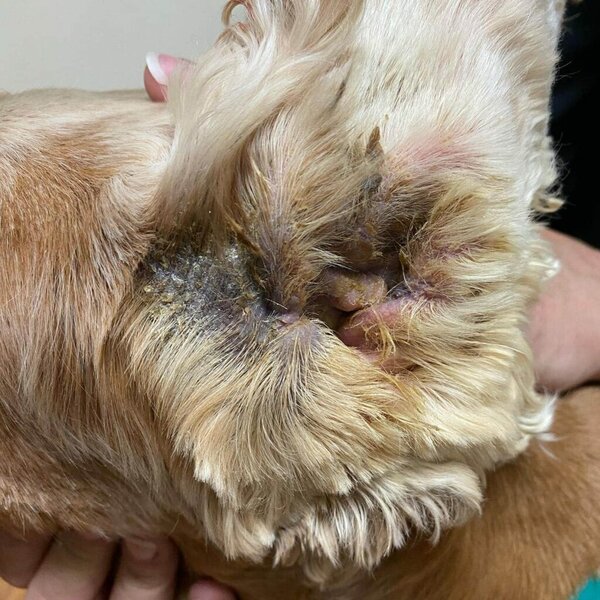
Goldendoodles are prone to ear infections as most dogs with V-shaped/floppy ears are. These ears are unable to let enough air flow through to the ear canal, so moisture is usually trapped creating a breeding ground for bacteria and infections such as yeast.
Symptoms of infected ears include swelling of the back of the ears, head shaking, or a foul odor. Treatment for ear infections includes cleaning the ears with ear cleansers, and in severe cases, your veterinarian may prescribe antibiotics.
Related Questions
What Is The Average Life Expectancy Of A Goldendoodle? Goldendoodles are known to live between 10 to 15 years. Their considerably long life expectancy is a genetic gift inherited by their parent breeds, Golden Retriever and Poodles. It can also be extended by a couple more years with a greater level of care and love, a strict but healthy diet, and an exercise routine.
Do Goldendoodles Get Cancer? Yes, Goldendoodles are prone to cancer. Goldendoodles, like their parent breeds, are susceptible to tumors and cancers such as hemangiosarcoma and lymphoma.
What’s Better Goldendoodle Or Labradoodle? Goldendoodles fare better than Labradoodles in terms of the social interaction aspect because Goldendoodles are more open to strangers whereas Labradoodles are more reserved. Actually, there are more similarities than differences between these two dog breeds. Both breeds are great family dogs that are loyal and sociable, and they both have a hypoallergenic coat that requires regular brushing. The choice is ultimately yours.

